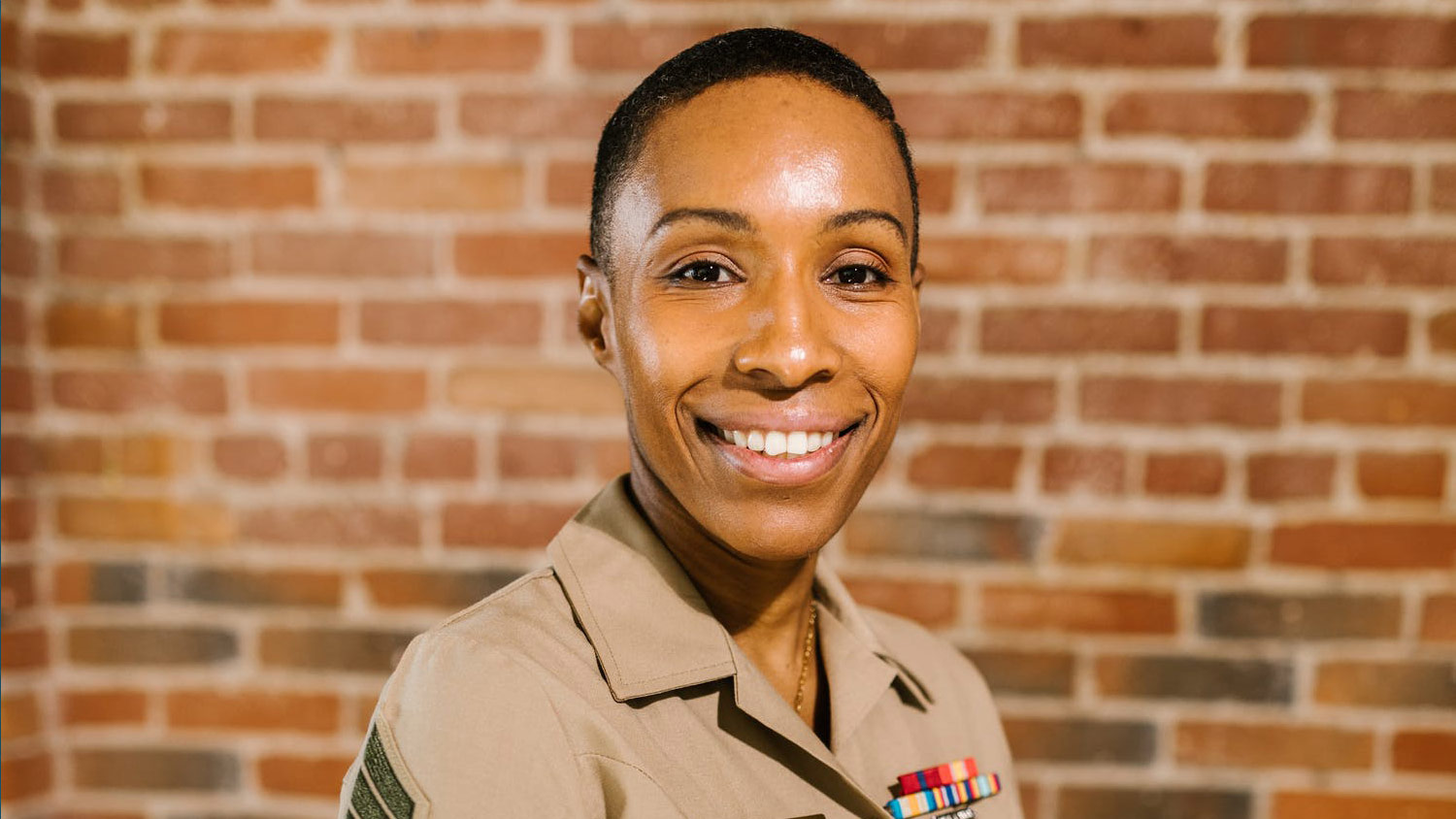Throughout United States history, female soldiers have served their country in a variety of military branches, ranks, and roles. In honor of their service, the federal government provides a wide range of benefits for women veterans.
6 Programs and Services for Women Veterans
- VA Health Care for Women
- Center for Women Veterans
- VA Benefits for Survivors of Military Sexual Trauma
- Women Veteran-Owned Small Business Initiative
- Maternity Care
- Women Veteran Coordinators
Ever since the Revolutionary War, American women have made important contributions and heroic sacrifices in service to their nation. Today, there are over 2 million veteran women in the United States. These brave women veterans have fought alongside men to keep America a free, safe country for generations to come.
If you are a female veteran with a record of military service, you may be eligible to receive government benefits through many programs and services that meet the unique needs of women vets.
1. VA Health Care for Women
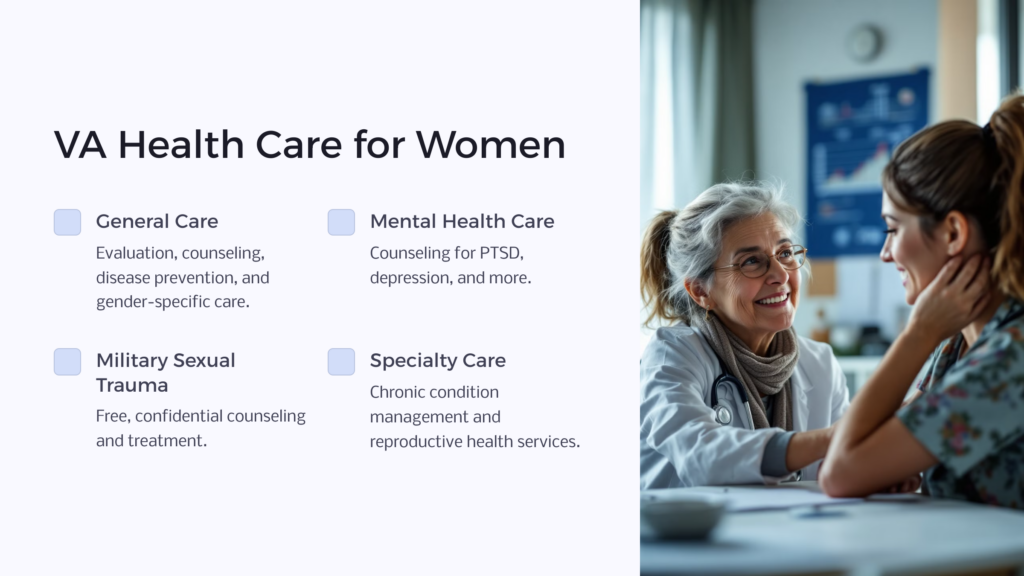
The Department of Veterans Affairs (VA) offers many veterans benefits for both male veterans and female veterans, including healthcare designed with the special health challenges veterans often face after leaving the armed services in mind.
Every VA medical center has a designated Women Veterans Program Manager, whose job it is to advise women veterans seeking health services from primary care to specialty care for chronic health issues or reproductive health.
VA Primary Care for Women includes the following health services:
General Care: Evaluation and counseling on one’s overall health, nutrition, and weight; disease prevention; assistance with quitting smoking; substance abuse counseling and treatment; gender-specific care (mammograms, pap smears, birth control, HPV vaccination, hormone replacement therapy for menopause, etc.)
Mental Health Care: Mental health counseling and help for issues including depression, post-traumatic stress disorder (PTSD), post-deployment adjustment to civilian life, sexual trauma, anxiety disorder, parenting, anger management, and much more.
Military Sexual Trauma: Unfortunately, military sexual trauma (MST) is not an uncommon experience among military service members, especially women. Confidential counseling and treatment for women veterans who have suffered mentally and/or physically from sexual assault or sexual harassment in the military are available free of cost at VA medical centers.
VA Specialty Care for Women includes the following health services:
Chronic Condition Management: Screening and services for diseases such as cancer, diabetes, heart disease, STDs, osteoporosis, and more.
Reproductive Health Care: Maternity care, limited infertility treatment and evaluation (VA is prohibited by law from providing in-vitro fertilization or abortions), urinary incontinence, tubal litigation, and more.
Rehabilitation and Long Term Care: Rehabilitation services including physical therapy, speech therapy, occupational therapy, and more for female veterans in need. The VA also provides homebound care and long-term services for those who require it and meet eligibility requirements to receive it.
In addition to these different types of medical care by trained professionals, veteran women enrolled in VA benefits are also entitled to service from medical professionals who can be reached 25/7 by phone to answer questions related to women’s health.
Special programs for homeless veterans, domestic abuse victims, and women vets who want to receive employment training or rehabilitation are also provided at VA medical centers.
If you would like to apply to receive VA health care benefits, you can do so online through the Department of Veterans Affairs website, by phone by calling a VA medical center, or in person by visiting any VA medical center office.
2. Center for Women Veterans
The Department of Veterans Affairs established the Center for Women Veterans (CWV) in 1994. The center is responsible for managing all benefits offered by VA to women veterans, including service-connected disability compensation, VA health care benefits, small business programs, and more.
Its purpose is two-fold: firstly, to serve the needs of veteran women by providing them with well-earned benefits, and secondly, to bring about the awareness, dignity, and respect that women veterans deserve from the culture they fought just as hard to protect as male veterans.
Women veterans make up 10% of the veteran population and around 2% of the female U.S. population, so they are often overlooked. The CWV seeks to bolster representation for female veterans and the way they are seen by the American public.
The CWV vet center advocates for women veterans through many projects, including an annual initiative celebrating servicewomen who made great strides in the U.S. military.
The 2021 Women Veteran Trailblazers campaign features 27 veteran women who made significant contributions in their military careers. The showcase features accomplished women veterans across all military branches who exhibit qualities of leadership and success within military ranks and their communities.
Another project headed by the Center for Women Veterans is the virtual I Am Not Invisible (IANI) exhibit, which spotlights women veteran employees of VA. The IANI exhibits’ goal is to boost dialogue surrounding female military veterans and open viewers’ eyes to the levels of expertise such veteran women possess.
In addition to initiatives to transform the way U.S. culture views women veterans, CWV offers online training for military women who are currently or will be shortly transitioning to civilian life on what healthcare services are available to them post-military from the Department of Veterans Affairs.
VA Women’s Health Transition Training is a self-paced, optional course open to all servicewomen. Topics such as the types of care offered to women veterans by VA, eligibility and enrollment requirements, finding a local VA center, and tips on connecting with other women in the veteran community post-service are discussed during the course.
3. VA Benefits for Survivors of Military Sexual Trauma
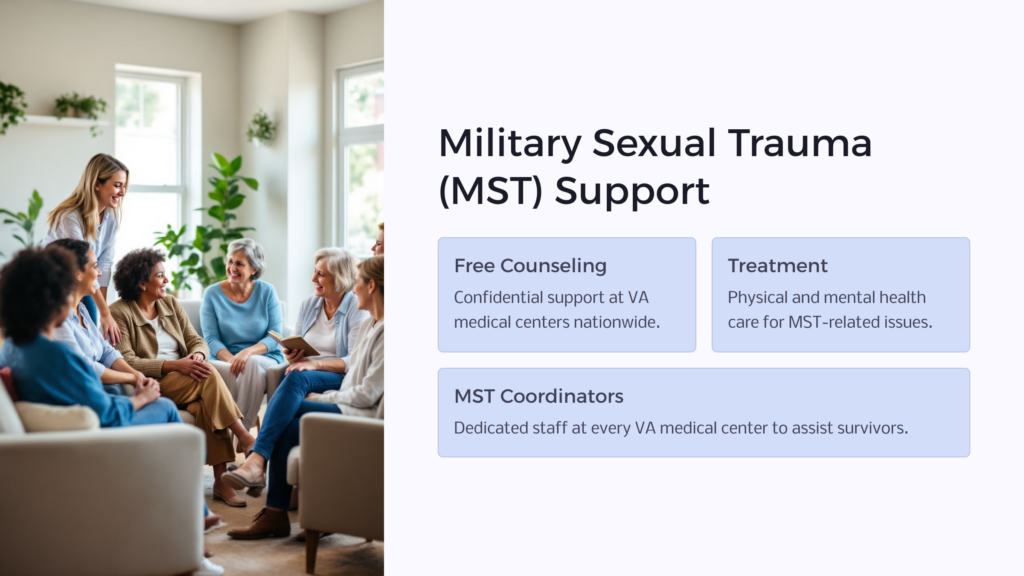
Military Sexual Trauma (MST) is the term used by the Department of Veterans Affairs for sexual assault or sexual harassment experienced by a service member during military service. MST can be experienced by all genders, but military women are the most common victims.
The VA department provides support and assistance to victims of Military Sexual Trauma in a variety of ways. Confidential, free counseling is offered at VA medical centers nationwide, along with treatment for both physical and mental health issues caused by MST.
To receive VA benefits related to MST, you do not need to have reported the incident or have any documented proof that you were the victim of sexual assault or harassment during your military service.
All female veterans and male veterans who have suffered from MST can receive help from VA, regardless of disability status or eligibility to receive regular VA health care benefits.
Every VA medical center has a designated MST coordinator that can help you with a plan towards healing that is right for you. If you have experienced MST, please do not hesitate to reach out to your local MST coordinator at a VA facility close to you.
4. Women Veteran-Owned Small Business Initiative
The Women Veteran-Owned Small Business Initiative (WVOSBI) is a first-of-its-kind federal women veterans program that focuses on empowering, educating, and bolstering opportunities for female veteran entrepreneurs.
WVOSBI seeks to procure certified women-veteran-owned small businesses that have been in business for 3-5 years with 3-5 full-time employees that make $500-1M minimum in revenue and have capabilities in underrepresented North American Industry Classification System codes (for example, information technology, construction, etc.) for the federal government to act as prime contractors.
Women veterans involved with WVOSBI enjoy benefits including access to a women veteran community of other sisters with an entrepreneurial spirit, subcontracting opportunities, government and commercial procurement opportunities, and more.
5. Maternity Care
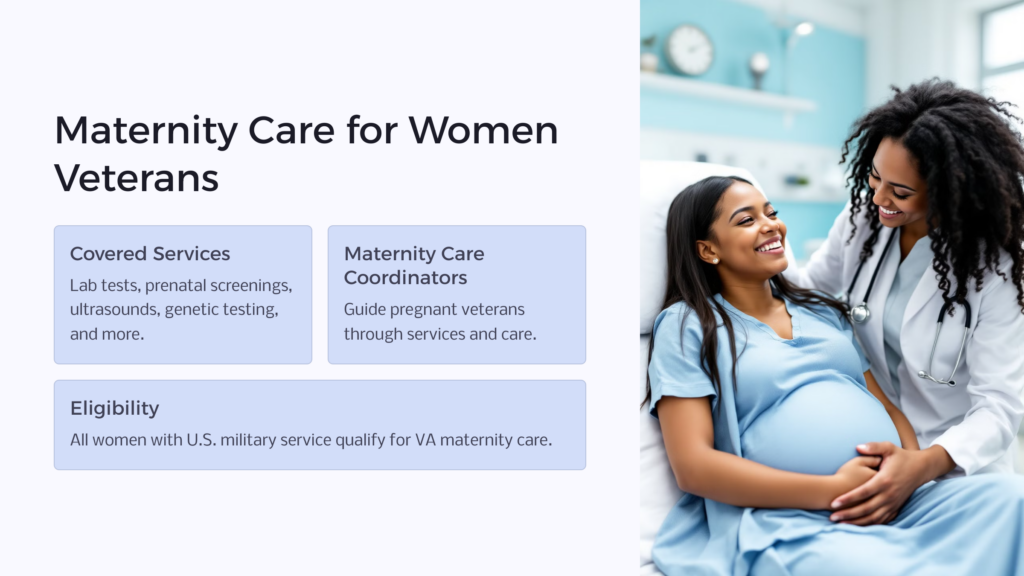
The Department of Veterans Affairs offers covered, full maternity care to eligible women veterans. Maternity Care Coordinators are available to guide a pregnant veteran woman through her pregnancy and assist her with getting the services she needs.
VA maternity care benefits include lab tests, physical examinations, prenatal screenings, education, ultrasounds, genetic testing, drug prescriptions, the first week of her newborn’s care, breastfeeding support, miscarriage or stillbirth services, and mental health care.
Notably, VA maternity care does not include home deliveries, doula or midwife (not a medical practitioner) services or delivery, experimental services, or abortion. VA is legally not allowed to terminate a pregnancy.
All women with U.S. military service are eligible to receive maternity care at a VA medical center.
6. Women Veteran Coordinators
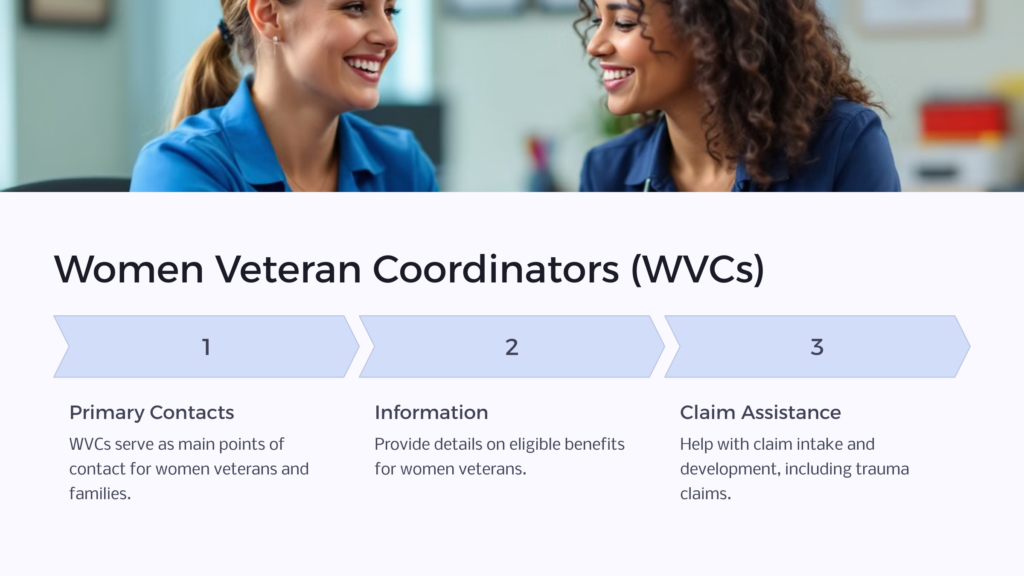
Every Department of Veterans Affairs office has Women Veteran Coordinators (WVCs) available to serve as primary contacts for veteran women, their military spouse, beneficiaries, and/or military families concerning VA benefits and non-VA benefits that can help them.
WVCs provide assistance in a variety of ways, including giving detailed information on benefits a woman veteran may be eligible for as well as handling claim intake and development, such as military personal or sexual trauma claims. To find a WVC who can help you or your family, contact your local VA office.
Women Veterans Day

Since the birth of the nation, women have been serving in the United States military. Women fought and spied on the British during the Revolution, fought in both the Union and Confederate armies during the Civil War, and served in a variety of roles during World War I.
During the Second World War, 350,000 American women served their nation. Of these women, 140,000 joined the Women’s Army Corps where they made significant contributions to the war effort, including cryptography and military intelligence.
The Women’s Armed Services Integration Act opened full military service to women during this time of war, but the act was originally intended to expire in 1948. However, in 1946, army leaders began urging the U.S. government to make the act a long-term one, and two years later, President Harry S. Truman did just that.
On June 12, 1948, the Women’s Armed Services Integration Act became permanent law, creating opportunities for women to serve as regular members of the U.S. armed forces during peacetime. Prior to this litigation, women could serve in the military reserve forces only as nurses. Now, that day is honored as Women Veterans Day, also called Women Veterans Recognition Day and Women Veterans Appreciation Day.
First celebrated in Hawaii in 2018 on June 12, Women Veterans Day is a testament to the day that women soldiers were recognized as essential, important members of the U.S. armed forces. The holiday is recognized by the states of California, Hawaii, Indiana, Kentucky, Michigan, New Jersey, New Mexico, New York, Ohio, Oregon, South Carolina, Tennessee, Texas, and Wisconsin. However, it is not yet a federal holiday.
Services and Benefits for Women Veterans
Today, women play a vital role in the United States military. Though often overlooked, the 2 million women veterans throughout our nation are valued members of society who deserve the utmost honor. Veteran women face unique challenges after leaving the armed forces and rejoining civilian life.
To assist female veterans, the federal government provides an array of benefits, from health care specific to the needs of women veterans to small business programs.
If you are a woman with a history of military service and would like to receive your well-deserved federal veterans’ services and benefits, be sure to get in contact with a VA office close to you.
 Benefits.com Advisors
Benefits.com Advisors
With expertise spanning local, state, and federal benefit programs, our team is dedicated to guiding individuals towards the perfect program tailored to their unique circumstances.
Rise to the top with Peak Benefits!
Join our Peak Benefits Newsletter for the latest news, resources, and offers on all things government benefits.















